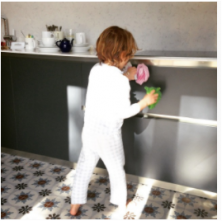
Sometimes we forget that a family home is a puzzle where we need all the pieces to fit. In other words, a family is the sum of its members. It is shown that if we involve our little ones in household chores early on, it supports their psychological development with skills such as their sense of responsibility, independence, self-confidence, collaboration, and assessment of their efforts as well as the importance of teamwork.
To begin, it is important to remember that:
- The jobs that you are going to give your little one need to be in accordance to their level of maturity, if not you could end up generating a feeling of anxiety, discouragement, and refusal in the future.
- Always value the effort that they put forth. In general terms, expecting perfection in the execution of a task is not the right way. You should reward their intention and initiative, as well as teach them how to do it better in the future.
- Parents are the role model, show them a positive attitude when you complete the daily chores.
- Always begin with a simple and concrete task, which has a clear objective. For example, instead of saying ”clean your room,” what do you think of ”organize your toys?”
- Using household chores as a punishment would be a serious mistake because we would inconsistently be giving them a negative connotation.
What household chores should we start with?
- Pick up their toys when they finish playing. This is an initial way we should support and help them do a simple and fun activity.
- Take care of the pets. Transferring partial care of an animal to them gives them the feeling of having a ”parent role.” This is an early responsibility that supports emotional maturity.
- Water the plants. A nice way to begin this activity is to go to a florist together and buy a plant of their choosing. From that moment on, they are the only one responsible for its care.
- Actively participate in the kitchen: Helping to set and clear the table, making them kitchen helpers! Unconsciously, they are learning to clean, plan, work as a team, and to be responsible with this activity, even better you get to share a delicious meal together!
- Help with household cleaning: sweep, mop, dust…as well as how to use different cleaning appliances.
- Doing the weekly grocery shopping. This activity should be done gradually, beginning with some small errands is a good option. What do they learn? Social interaction, how stores function, using money, and paying bills, all of which have value in the real world.
Learn More:
- How to Cultivate a Sense of Responsibility in Children
- The Use of Money in Childhood – Allowance, yes or no?
- How to Support Learning Mathematics for 4 Year Olds
- What Is Unlearning? How Can We Fight It in Summer?
- How to Manage Temper Tantrums and Outbursts
Latest posts by Casey Aubin (see all)
- Master Math! 10 Reasons to Help Your Child do Just That - 05/28/2020
- Why Do Children Believe That Things Happen? - 05/25/2020
- Is Self-Control Linked to Health? - 05/19/2020







